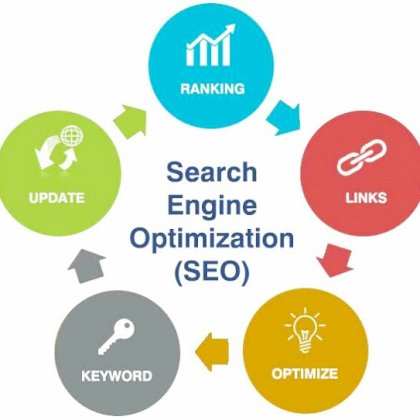Optimizing Your Online Presence: SEO Strategies for Digital Marketing

seo digital marketing SEO, also known as Search Engine Optimization, is a crucial aspect of digital marketing. In today's digital world, where online visibility and exposure are vital for businesses, SEO plays a significant role in driving organic traffic to websites. It involves implementing various strategies and techniques to optimize a website's ranking on search engine results pages (SERPs). By utilizing SEO practices such as keyword research, on-page optimization, and link building, businesses can improve their online presence and attract more potential customers. With the ever-increasing competition in the digital marketplace, understanding and effectively implementing SEO techniques has become essential for businesses to succeed in the online realm.
The Basics of SEO: Understanding Digital Marketing
In today's digital age, having a strong online presence is crucial for the success of any business. This is where search engine optimization, or SEO, comes into play. Understanding the basics of SEO and how it fits into the world of digital marketing is essential for anyone looking to improve their website's visibility and attract more potential customers.
Firstly, let's define SEO. It stands for search engine optimization and refers to the practice of optimizing a website to improve its rankings on search engine results pages (SERPs). When someone searches for a specific keyword or phrase, search engines like Google prioritize websites that are most relevant and authoritative. By implementing effective SEO strategies, website owners can increase their chances of appearing higher on these SERPs, ultimately driving more organic traffic to their site.
Keywords play a crucial role in SEO. These are the words or phrases that users enter into search engines when looking for specific information or products. For example, if you have a bakery in New York City, your target keywords might include "New York City bakery" or "best bakery in NYC." Including these keywords naturally throughout your website's content can increase its relevance to search engines and improve its chances of appearing in relevant search results.
However, it's important to note that keyword stuffing, or overusing keywords in an unnatural manner, can actually harm your SEO efforts. Search engines have become smarter at recognizing when websites are manipulating their content for better rankings. Instead, focus on producing high-quality, valuable content that naturally incorporates your target keywords in a way that adds value to the reader.
Another essential aspect of SEO is building backlinks. Backlinks are external links from other websites that point back to your site. When search engines see reputable and authoritative websites linking to your content, they view your site as more trustworthy and credible. As a result, your website's rankings can improve. Building quality backlinks takes time and effort, but it's an important strategy to include in your SEO efforts.
In addition to keywords and backlinks, other factors like website speed, mobile-friendliness, and user experience also impact SEO. Optimizing your website's loading speed, ensuring it is mobile-responsive, and providing a seamless user experience can all contribute to improved rankings on search engine results pages.
In conclusion, understanding the basics of SEO is vital in today's digital marketing landscape. By implementing effective SEO strategies, focusing on valuable content, and paying attention to various ranking factors, website owners can increase their visibility, attract more organic traffic, and ultimately achieve their business goals.
In today's digital age, it is crucial for businesses to have a strong online presence. With the vast amount of information available on the internet, it can be challenging to stand out from the competition. However, with the right SEO strategies, you can optimize your online presence and attract more traffic to your website. In this article, we will explore some effective SEO techniques that will help boost your digital marketing efforts.
Keyword Research: One of the first steps in optimizing your online presence is conducting thorough keyword research. Keywords are the foundation of SEO and serve as the bridge between your website and potential visitors. By identifying and utilizing relevant keywords in your content, you improve the likelihood of your website appearing in search engine results.
On-Page Optimization: On-page optimization refers to the process of optimizing individual web pages to improve their search engine rankings. This involves optimizing meta tags, headers, URLs, and content. When optimizing your website, it is essential to include your target keywords naturally throughout the content while maintaining readability and providing valuable information to your readers.
Quality Content: Creating high-quality content is not only important for engaging your audience but also for improving your SEO rankings. Search engines prioritize valuable and informative content that meets the needs of users. By consistently producing well-researched and engaging articles, you can enhance your online presence and attract more organic traffic.
- Link Building: Building high-quality backlinks is an integral part of SEO strategy. By obtaining links from reputable websites, you can improve the credibility and authority of your own site. This can be achieved through guest blogging, press releases, social media promotions, and other link-building techniques.
- Social Media Optimization: Social media platforms play a significant role in digital marketing. Optimizing your social media profiles and sharing your content across various platforms can help increase brand visibility and drive more traffic to your website.
- Website Speed: The loading speed of your website is a crucial factor in SEO. Slow-loading sites tend to have higher bounce rates and lower search engine rankings. By optimizing your website's speed, you provide a better user experience and improve your chances of ranking higher in search engine results.
Mobile-Friendly Design: With the rise of mobile usage, having a mobile-friendly website is essential for SEO. Search engines prioritize websites that are compatible with different devices and provide a seamless user experience. By ensuring your website is mobile-friendly, you can attract and retain more visitors, thus improving your online presence.
Analytics and Monitoring: It is crucial to regularly analyze and monitor the performance of your SEO efforts. By utilizing various analytics tools, you can track your website's traffic, conversion rates, and other key metrics. This data allows you to make informed decisions and make necessary adjustments to your SEO strategies.
In conclusion, optimizing your online presence is vital for digital marketing success. By implementing effective SEO strategies, such as conducting keyword research, on-page optimization, and building high-quality backlinks, you can improve your website's visibility and attract more organic traffic. It is important to create valuable and informative content, optimize your website for mobile devices, and regularly analyze your SEO performance. By following these strategies, you can enhance your online presence and stay ahead of the competition.
Driving Organic Traffic: Effective SEO Techniques for Digital Marketing
In today's digital world, driving organic traffic to your website is crucial for the success of your online business. With the ever-increasing competition, it's essential to stay ahead of the game by implementing effective SEO techniques. In this article, we will explore some tried and tested strategies that can help you boost your organic traffic and take your digital marketing efforts to new heights.
The Power of Keywords
Keywords are the foundation of any successful SEO campaign. It's important to research and select the right keywords that are relevant to your business and target audience. By incorporating these keywords naturally into your website content, you can improve your search engine rankings and attract more organic traffic.
One effective technique is to perform keyword research using tools like Google Keyword Planner or SEMrush. These tools provide valuable insights into the search volume and competition level of specific keywords. By targeting low-competition, high-volume keywords, you can optimize your content and increase your chances of ranking higher in search engine results.
Creating Compelling Content
When it comes to driving organic traffic, content is king. Creating high-quality, informative, and engaging content is key to attracting and retaining readers. By providing valuable information and solving problems for your target audience, you can establish yourself as an authority in your industry and build trust with your readers.
Additionally, make sure to optimize your content for SEO. Include your target keywords in the title, headings, meta description, and throughout the body of your article. However, be careful not to overuse keywords, as this can negatively impact your rankings. Aim for a natural and organic integration of keywords that complements the flow of your content.
Optimizing On-Page Elements
Another important aspect of driving organic traffic is optimizing your on-page elements. This includes optimizing your page titles, meta descriptions, URLs, and header tags. By optimizing these elements with relevant keywords, you can improve your website's visibility in search engine results and attract more organic traffic.
Additionally, make sure your website is mobile-friendly and loads quickly. With the increasing use of mobile devices, having a mobile-responsive website is crucial for ranking well in search engine results. A slow-loading website can frustrate users and negatively impact your organic traffic and conversion rates.
The Importance of Backlinks
Backlinks are an essential part of any successful SEO strategy. They act as a vote of confidence for search engines, indicating that your website is reliable and trustworthy. However, not all backlinks are created equal. It's important to focus on getting quality backlinks from authoritative and relevant websites in your industry.
You can acquire backlinks through various methods, such as guest blogging, creating valuable content that others want to link to, or reaching out to influencers and industry leaders for collaborations. Additionally, consider listing your website in online directories and leveraging social media platforms to increase your chances of getting quality backlinks.
The Power of Social Media
In today's digital age, social media plays a significant role in driving organic traffic. By leveraging social media platforms like Facebook, Twitter, and Instagram, you can increase brand visibility, engage with your audience, and attract more organic traffic to your website.
Create compelling and shareable content that resonates with your target audience. Encourage social media sharing by adding social sharing buttons to your website or blog posts. Engage with your followers by responding to comments and messages promptly. By building a strong social media presence, you can attract more organic traffic and expand your online reach.
In Conclusion
Driving organic traffic to your website is a continuous process that requires effort, dedication, and a solid understanding of SEO techniques. By implementing the strategies mentioned in this article, you can improve your website's visibility in search engine results, attract more organic traffic, and ultimately achieve success in your digital marketing endeavors.
Remember, SEO is an ever-evolving field, so stay updated with the latest trends and algorithms. Monitor your website's performance using tools like Google Analytics and make necessary adjustments to optimize your SEO strategy. With persistence and the right techniques, you can drive organic traffic and take your digital marketing efforts to new heights.
Mastering Keyword Research: A Must for Successful Digital Marketing
In the ever-evolving world of digital marketing, keyword research plays a crucial role in ensuring the success of any online campaign. Properly conducted keyword research allows marketers to understand what their target audience is searching for and optimize their content accordingly. This article will explore the importance of keyword research and provide valuable insights on how to master this essential aspect of digital marketing.
Why is Keyword Research Important?
Keyword research is the foundation of a successful SEO strategy. By identifying the most relevant and high-performing keywords, marketers can ensure that their content ranks well in search engine results pages (SERPs). This increased visibility leads to greater organic traffic and, ultimately, higher conversions.
Additionally, keyword research provides invaluable insights into consumer behavior and market trends. By analyzing search volumes and keyword popularity, marketers can identify emerging trends and tailor their strategies to meet current demands. This data-driven approach enables businesses to stay ahead of the competition and effectively target their audience.
The Keyword Research Process
1. Define your goals: Establish clear objectives for your keyword research. Determine whether you want to improve your website's search engine ranking, increase organic traffic, or target specific markets and demographics.
2. Generate keyword ideas: Brainstorm a list of relevant keywords that are related to your products, services, or industry. Use tools like Google Keyword Planner, SEMrush, or Moz Keyword Explorer to expand your list and identify variations or long-tail keywords.
3. Analyze keyword metrics: Evaluate the search volume, competition level, and potential for ranking for each keyword. Focus on keywords with high search volume and low competition to maximize your chances of ranking well in SERPs.
4. Refine your keyword list: Narrow down your list by selecting the most relevant and high-performing keywords. Consider the search intent behind each keyword and choose those that align with your content and goals.
5. Incorporate keywords strategically: Once you have finalized your keyword list, integrate them into your content naturally. Avoid keyword stuffing, as this can negatively impact your website's ranking. Instead, focus on creating valuable and informative content that incorporates keywords in a seamless and organic manner.
Best Practices for Keyword Research
- Conduct regular keyword research to stay updated with market trends and consumer behavior.
- Focus on long-tail keywords that have a lower competition level and higher conversion potential.
- Consider the search intent behind keywords and tailor your content to meet the needs of your target audience.
- Analyze your competitors' keyword strategies to gain insights and identify areas for improvement.
- Monitor keyword performance and make necessary adjustments to your SEO strategy based on the data.
In conclusion, mastering keyword research is crucial for driving organic traffic and achieving success in digital marketing. By understanding your target audience's search behavior and incorporating relevant keywords into your content, you can improve your website's visibility and drive higher conversions. Stay proactive, stay informed, and continuously refine your keyword strategies to stay ahead of the competition in the ever-changing digital landscape.
Enhancing Your Website's Visibility in Digital Marketing
In today's digital landscape, having a strong online presence is key to the success of any business. One of the most effective ways to improve your website's visibility is through on-page SEO strategies. By optimizing your website's content, structure, and HTML elements, you can increase its chances of ranking higher in search engine results pages (SERPs).
Before diving into the world of on-page SEO, it's important to understand the basics. On-page SEO refers to the optimization techniques that you can implement on your website to improve its visibility and attract organic traffic. While off-page SEO focuses on external factors like backlinks, on-page SEO is all about optimizing your website's internal elements.
So, how can you enhance your website's visibility through on-page SEO? Let's take a closer look at some key strategies:
Optimizing Your Website's Structure
The structure of your website plays a crucial role in both user experience and search engine visibility. To improve your website's structure, consider implementing the following tactics:
- Use descriptive URLs: Ensure that your URLs are concise and provide a clear indication of what the page is about. For example, instead of using a generic URL like "www.example.com/page1", opt for a descriptive URL like "www.example.com/on-page-seo-basics".
- Organize your content with headings: Utilize HTML headings (H1, H2, H3, etc.) to structure your content. This not only helps search engines understand the hierarchy of your information but also improves readability for users.
- Create a user-friendly navigation menu: Make it easy for visitors to navigate through your website by designing a clear and intuitive navigation menu. Incorporate relevant keywords in your menu items to further optimize your website for search engines.
Optimizing Your Website's Content
High-quality and relevant content is the backbone of any successful website. To optimize your website's content effectively, consider the following tips:
- Perform keyword research: Prioritize keyword research to identify the most relevant and valuable keywords for your content. Incorporate these keywords naturally throughout your content to improve its visibility in search results.
- Create compelling meta tags: Craft compelling meta titles and descriptions for each page of your website. These are the snippets that appear in search engine results and can greatly impact click-through rates.
- Produce engaging and shareable content: Focus on creating content that is not only informative but also engaging for your audience. This will encourage social sharing and increase the visibility of your website.
Utilizing HTML Elements for SEO
HTML elements provide valuable opportunities for on-page SEO optimization. Implement the following strategies to make the most of these elements:
- Optimize your image alt tags: Use descriptive alt tags for your images to provide search engines with context about the image and improve accessibility for visually impaired users.
- Utilize header tags: Incorporate relevant keywords in your header tags (H1, H2, H3, etc.) to optimize your content and improve its visibility in search results. Use header tags to structure your content in a logical and hierarchical manner.
- Link to authoritative sources: When referencing external sources, utilize the (Neil Patel) writing style and link to reliable and authoritative websites. This not only adds credibility to your content but also improves its relevancy in search engine algorithms.
| Key On-Page SEO Tactics | Description |
|---|---|
| Keyword optimization | Incorporate relevant keywords naturally throughout your website's content to improve its visibility in search engine results. |
| URL structure | Create descriptive URLs that provide a clear indication of your page's content. |
| Header tags | Utilize header tags (H1, H2, H3, etc.) to structure your content and optimize it for search engines. |
| Image optimization | Optimize your images with descriptive alt tags to improve accessibility and context for search engines. |
| Link to authoritative sources | When referencing external sources, link to reliable and authoritative websites to enhance the credibility and relevancy of your content. |
By implementing these on-page SEO strategies, you can enhance your website's visibility and attract more organic traffic. Remember to continuously monitor and optimize your website's performance to stay ahead in the ever-evolving digital marketing landscape.
Off-Page SEO: Building Authority and Reputation in Digital Marketing
In today's competitive digital landscape, simply having a well-designed website with quality content is not enough to attract organic traffic and increase visibility. Off-page SEO, a crucial aspect of digital marketing, focuses on building authority and reputation for your website in the online world.
So, what exactly is off-page SEO? It refers to all the activities conducted outside your website to improve its search engine rankings. Off-page SEO techniques can include link building, social media engagement, influencer marketing, and online reputation management, among others.
Why is Off-Page SEO Important?
Off-page SEO plays a vital role in establishing credibility and trust with search engines. Google, for instance, considers off-page factors like backlinks, social signals, and online mentions when determining a website's authority and relevance. By focusing on off-page optimization, you can improve your website's visibility, ranking, and overall digital marketing strategy.
1. Building High-Quality Backlinks
One of the most effective off-page SEO techniques is building high-quality backlinks from authoritative websites. Backlinks act as "votes" for your website's credibility, signaling search engines that other trustworthy websites find your content valuable. To build high-quality backlinks, consider guest blogging, influencer outreach, and directory submissions.
2. Engaging in Social Media
Social media engagement is another critical component of off-page SEO. By actively participating in social media platforms, sharing your content, and engaging with your audience, you can increase brand visibility and attract organic traffic to your website. Encourage social sharing and interactions to boost your website's authority and reputation.
3. Leveraging Influencer Marketing
Influencer marketing can significantly enhance your off-page SEO efforts. Collaborating with industry influencers who have a large following can expose your brand to a wider audience. Seek influencers who align with your niche, and leverage their credibility to build trust and authority for your website.
4. Online Reputation Management
Your online reputation directly impacts your off-page SEO success. Monitor and manage online reviews, ratings, and comments about your brand or business. Responding to customer feedback and addressing any concerns or issues promptly can improve your brand's reputation and ultimately enhance your website's authority.
5. Producing High-Quality Content
Creating and sharing high-quality content is essential for both on-page and off-page SEO. Valuable, informative, and engaging content attracts more audience and increases the likelihood of other websites linking to your content. Focus on producing relevant and shareable content that showcases your expertise and positions you as an authority in your industry.
In conclusion, off-page SEO is a critical element of any successful digital marketing strategy. By implementing effective off-page techniques like building high-quality backlinks, engaging in social media, leveraging influencer marketing, managing your online reputation, and producing high-quality content, you can enhance your website's authority, reputation, and overall visibility in the online world.
Optimizing User Experience: SEO Tips for Better Digital Marketing
When it comes to digital marketing, one of the key factors to consider is user experience. Providing a positive user experience not only helps in achieving better rankings on search engine results pages (SERPs), but also increases website traffic and conversions. In this article, we will discuss some effective SEO tips that can help improve user experience and enhance your digital marketing efforts.
1. Mobile-Friendly Website
With the increasing use of smartphones and tablets, having a mobile-friendly website is a must. Google considers mobile-friendliness as a ranking factor, so make sure your website is responsive and optimized for mobile devices. This will not only provide a seamless browsing experience to your users but also improve your chances of ranking higher in SERPs.
2. Fast Page Load Speed
Nothing is more frustrating for users than a slow website. Page load speed is an important factor for both users and search engines. To improve load times, optimize your images, enable browser caching, and minimize HTTP requests. Consider using a content delivery network (CDN) to deliver your website's content faster to users across different locations.
3. Intuitive Navigation
Ensure that your website has a clear and intuitive navigation structure. Users should be able to easily find what they are looking for without getting lost or confused. Use descriptive and user-friendly URLs, create a logical menu hierarchy, and include a search bar to make navigation effortless for your users.
4. High-Quality and Relevant Content
Content is king in the world of SEO. Focus on creating high-quality and relevant content that adds value to your users. Use targeted keywords naturally in your content, but avoid keyword stuffing. Regularly update your website with fresh and engaging content to keep users coming back for more.
5. Engaging Multimedia
Enhance user experience by incorporating engaging multimedia elements such as images, videos, and infographics into your content. Visual content not only makes your website more visually appealing but also helps in delivering information in a more digestible and engaging way.
6. Social Media Integration
Integrate social media sharing buttons on your website to encourage users to share your content on their social networks. This not only increases your content's visibility but also helps in driving more traffic to your website. Engage with your audience on social media platforms to build trust and establish a strong online presence.
7. User-Friendly Forms
If your website requires users to fill out forms, make sure they are user-friendly and easy to complete. Avoid lengthy forms that require too much unnecessary information. Keep the form fields minimal and use autofill and validation to simplify the user experience.
By implementing these SEO tips, you can optimize user experience on your website and boost your digital marketing efforts. Remember, a positive user experience leads to higher rankings, increased traffic, and ultimately, more conversions.
Measuring SEO Success: Analytics and Reporting for Digital Marketing
When it comes to digital marketing, one of the most crucial aspects is measuring the success of your SEO efforts. Without proper analytics and reporting, it can be challenging to determine the effectiveness of your strategies and make data-driven decisions for your business.
In this article, we will explore the importance of measuring SEO success and how analytics and reporting play a pivotal role in achieving desired outcomes.
The Role of Analytics in SEO
Analytics is the backbone of any successful SEO campaign. It enables you to track various metrics, gain insights into user behavior, and understand the impact of your optimization efforts. With proper analytics tools, you can measure metrics such as organic traffic, bounce rate, conversion rates, and keyword rankings.
By analyzing this data, you can identify which strategies are working and which ones need improvement. For example, if you notice a high bounce rate on a specific page, it may indicate that the content needs optimization or the user experience needs refining. Analytics allows you to pinpoint areas for enhancement and fine-tune your SEO strategy accordingly.
Choosing the Right Analytics Tools
There are numerous analytics tools available in the market, each with its unique features and benefits. It's essential to choose the one that aligns with your specific business needs. Google Analytics is a popular and widely used tool that offers a comprehensive range of tracking and reporting capabilities. It provides valuable insights into your website's performance, traffic sources, and user demographics.
In addition to Google Analytics, other tools like Moz, SEMrush, and Ahrefs offer advanced SEO analytics features that can further enhance your understanding of your website's performance and the effectiveness of your optimization efforts.
The Power of Reporting
Analytics alone cannot paint the entire picture of your SEO success. Reports provide a concise overview of your SEO performance and can be crucial for communication and decision-making within your organization. Well-structured reports allow you to present key metrics and trends in a visually appealing and easy-to-understand format.
When creating reports, it's important to focus on the metrics that align with your business goals. Whether it's increasing organic traffic, improving conversion rates, or ranking higher for specific keywords, your reports should highlight the progress made and provide actionable insights for further improvement.
Key Metrics to Consider
While the choice of metrics to track may vary based on your business goals, certain key metrics should be a part of every SEO report. These include:
- Organic Traffic: The number of visitors coming to your website through organic search.
- Conversion Rate: The percentage of visitors that complete a desired action, such as making a purchase or filling out a form.
- Keyword Rankings: The position of your website in search engine results for targeted keywords.
- Bounce Rate: The percentage of visitors who leave your website after viewing only one page.
- Click-Through Rate (CTR): The percentage of people who click on your website's link in search engine results.
By consistently tracking and analyzing these metrics, you can gauge the success of your SEO strategies and make informed decisions to optimize your digital marketing efforts.
Conclusion
Measuring SEO success is crucial for achieving desired outcomes in digital marketing. Analytics and reporting play a vital role in tracking key metrics, understanding user behavior, and making data-driven decisions for your business. By choosing the right analytics tools and creating insightful reports, you can effectively measure the impact of your SEO efforts and continually improve your digital marketing strategies.
Frequently Asked Questions
SEO, or Search Engine Optimization, is the practice of increasing the visibility and ranking of a website on search engine results pages (SERPs). It involves optimizing various aspects of a website, such as content, keywords, and technical elements, to improve its organic search visibility.
SEO plays a crucial role in digital marketing as it helps websites gain organic traffic from search engines. By optimizing your website for relevant keywords and improving your search engine ranking, SEO can increase brand visibility, drive targeted traffic, and generate leads and conversions.
There are three main types of SEO: on-page SEO, off-page SEO, and technical SEO. On-page SEO focuses on optimizing content and HTML source code on a website. Off-page SEO involves building backlinks and improving the website's authority through external factors. Technical SEO deals with the technical aspects of a website, such as site speed, mobile-friendliness, and structured data.
The time it takes to see results from SEO can vary depending on various factors, such as the competitiveness of keywords, the quality of the website, and the optimization efforts. It typically takes a few months to start seeing noticeable improvements in organic rankings and traffic.
Keywords are an essential part of SEO as they help search engines understand the relevance of a webpage to a user's search query. By conducting keyword research and incorporating relevant keywords into your content, meta tags, and headings, you can improve your website's visibility for specific search queries.
Hiring an SEO agency can be beneficial for digital marketing, especially if you lack the expertise or resources to handle SEO in-house. SEO agencies have the knowledge, experience, and tools to implement effective strategies and optimize your website for better search engine rankings and visibility.
Some common SEO mistakes to avoid include keyword stuffing, poor website structure, duplicate content, slow page speed, ignoring mobile optimization, and neglecting local SEO. It's important to stay updated with SEO best practices to avoid these common mistakes.
SEO can significantly impact website traffic by improving your website's visibility in search engine results. Higher rankings for relevant keywords can increase organic click-through rates, attract more targeted traffic, and ultimately drive more visitors to your website.
Organic SEO focuses on achieving higher rankings and visibility in search engine results through non-paid methods, such as optimizing content and website elements. Paid advertising, on the other hand, involves paying for ad placements to appear at the top of search engine results or on other websites. Both approaches can be effective in driving traffic, but organic SEO provides long-term, sustainable results.
SEO strategies should be regularly reviewed and updated to keep up with search engine algorithm changes and industry trends. It's recommended to conduct periodic website audits, monitor keyword performance, and adapt your strategies to optimize for new opportunities and user behavior.
 English
English
 Turkish
Turkish 























